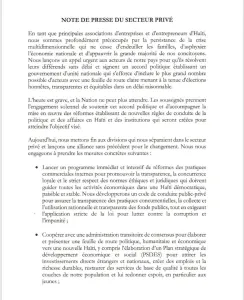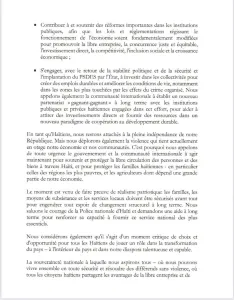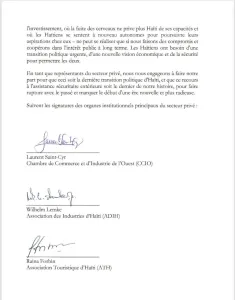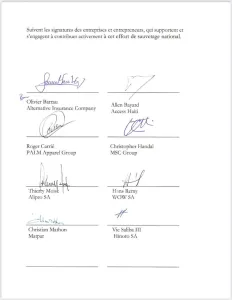The private business sector is deeply concerned by the persistence of the Haitian crisis marked by chronic insecurity and endemic poverty. Thus, the main business associations and entrepreneurs of Haiti invite the protagonists to find a compromise in order to sign a political agreement for the establishment of a government of national unity. The business associations and entrepreneurs of Haiti suggest a broad government, including many actors from various backgrounds around a roadmap based on the realization of “honest, transparent and fair elections within a reasonable time.
The private sector solemnly pledges its support for this political agreement and says it is ready to “accompany the implementation of reforms establishing new rules for conducting politics and business in Haiti and the institutions that will be created to achieve the desired goal.
There is no more division within the Haitian private sector, according to the note published this Thursday, December 8, 2022. “Today, we put an end to the divisions that separated us in the private sector and launch an unprecedented alliance for change,” reads the note.
The business associations and entrepreneurs of Haiti are committed to taking several concrete steps, the first of which is the “launch of an immediate and intensive program of reforms of internal business practices to promote transparency, fair competition and strict adherence to ethical and legal standards that must guide all economic activities in a democratic Haiti, peaceful and stable Haiti,” adding that they will develop a public-private code of conduct to ensure transparent competitive practices and the rational and transparent collection and use of public funds, while demanding strict enforcement of the law to fight corruption and impunity.
They also intend to “cooperate with a transitional consensus administration to develop and present a political, humanitarian and economic roadmap to a new Haiti, including the development of a Strategic Plan for Economic and Social Development (PSDES) to attract foreign and domestic direct investment, create sustainable jobs and wealth, restore quality basic services to all segments of our population and give them hope, especially young people.
The private sector also says it wants to “contribute to and support important reforms in public institutions, so that the laws and regulations governing the functioning of the economy are fundamentally changed to promote free enterprise, fair and equitable competition, direct investment, competitiveness, social inclusion and economic growth.
It also pledges “with the return of political stability and security and the implementation of the PSDES by the State, to invest in communities to create sustainable jobs and improve living conditions, especially in areas most affected by the effects of organized crime”, calling on the international community “to establish a new long-term ‘win-win’ partnership with Haitian public and private institutions committed to this effort, to help attract direct investment and provide resources in a new paradigm of cooperation for sustainable development.
Haiti’s business associations and entrepreneurs say they are committed to the country’s sovereignty. However, because of the violence that is crippling the national economy, they are calling “urgently on the government and the international community to act now to support and protect the free movement of people and goods across Haiti, and to protect Haitian families – especially those in the poorest regions, and the farmers on whom much of our economy depends.
“The time has come for patriotic realism: families, livelihoods, and local services must be secured above all else to engender any hope for long-term structural change. We salute the courage of the Haitian National Police and call for long-term support to strengthen its capacity to provide this most essential national service,” writes the Haitian private sector, which in turn invites all Haitians everywhere to play a role in the country’s transformation.
in the transformation of the country.
“The national sovereignty to which we all aspire-where we can live together safely and resolve disputes without violence, where all Haitian citizens share in the benefits of free enterprise and investment, where the brain drain no longer robs Haiti of its capabilities, and where Haitians feel empowered once again to pursue their aspirations at home-can only be achieved if we compromise and cooperate in the long-term public interest. Haitians need an urgent political transition, a new economic vision and the security to enable both,” the memo said.
The Haitian private sector says it wants to commit to long-term stability in the country, arguing that it wants “this to be the last political transition in Haiti, and that this recourse to external security assistance is the last in our history, to break with the past and mark the beginning of a new and brighter era.
Signed by: Laurent Saint-Cyr of the Chamber of Commerce and Industry of the West (CCIO), Wilhelm Lemke of the Association of Industries of Haiti (ADIH), Raina Forbin of the Tourist Association of Haiti (ATH), Olivier Barrau of Alternative Insurance Company, Allen Bayard of Access Haiti, Roger Carrié of PALM Apparel Group, Christopher Handal of MSC Group, Thierry Moise of Alipro SA, Hans Remy of WOW SA, Christian Mathon of Matpar, Vic Saliba III of Hinoto SA, P/O Eddy Deeb of Deka Group, Joël Bonnefil of Haytrac, Harold Marzouka Jr of Groupe HM, P/O Reuven Bigio of GB Group, Philippe Coles of Groupe Coles.












